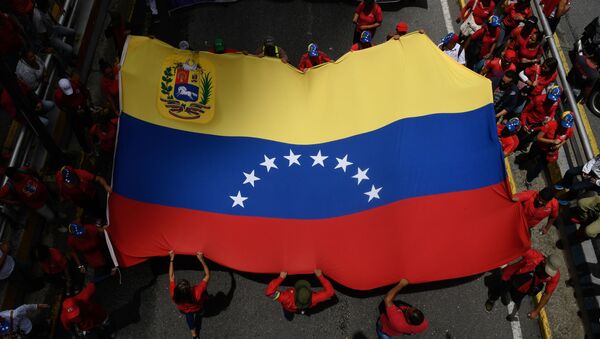The Bolivarian Republic of Venezuela has denounced the Trump administration’s latest round of sanctions, calling them a “serious aggression” against the Venezuelan people.
The order, entitled “Blocking Property of the Government of Venezuela,” also restricts entry of “sanctioned persons” into the United States, as well as seizing government assets, including those used for diplomatic engagements at the United Nations.
.@SecPompeo: On August 5, the United States imposed full blocking sanctions on the Government of #Venezuela, to target the former Maduro regime and those who support it. General licenses enable humanitarian aid and protect the government led by @JGuaido https://t.co/2kedmZc7lT
— US Embassy, Armenia (@usembarmenia) August 7, 2019
According to the statement, the Trump administration has “made clear” that “all options are on the table”, but vows to “use every appropriate tool to end Maduro’s hold on Venezuela” as well as “ensure a democratic transition in Venezuela”.
But Caracas hit back, calling the order “arbitrary actions of economic terrorism” against the Venezuelan people, stating that Washington is seeking to formalise the “criminal” blockade against the Latin American country, a spokesperson from the Venezuelan government said on Tuesday.
Washington’s goals are also to “asphyxiate the Venezuelan people” and “force an unconstitutional change of government”, violating principles in the UN Charter.
International lawlessness’: George Galloway slams Lima group gathering with US, without #Venezuela Full Video: https://t.co/LQdB7Ta5lx pic.twitter.com/Yu8PnUZGvh
— George Galloway (@georgegalloway) August 7, 2019
Caracas accused the US “ruling elite" of granting "legal form to the blockade" against assets owned by Venezuela, constituting the “most grotesque and brazen looting” in contemporary history, citing the “illegal robbery” of US oil and gas company Citgo, which Caracas owns a roughly 40 percent share, as well as the siege against the Venezuelan embassy in Washington, DC in May.
"The White House and its allies seek new opportunities and resources to usurp and loot what belongs to the more than 30 million Venezuelans,” the spokesperson added.
The spokesperson said: “The international community must take into consideration that it takes much more than a supremacist tycoon who is in the midst of an election campaign, or an out-dated warmongering hawk, obsessed and desperate not to lose his job, to undo the libertarian work initiated by the Liberator Simón Bolívar and resumed in the 21st century by Commander Hugo Chávez.
The US thought it would win in Venezuela within a few days & install a puppet. The people defended the Revolution steadfastly. The current illegal economic warfare (& the blockade of Cuba, the meddling in Nicaragua or Bolivia) is imperialism. Fight imperialism, join the struggle! pic.twitter.com/8VFkvxdZ14
— Aaron James Kelly (@aaronke13972312) August 7, 2019
The spokesperson stated that it was “clearly evident” that the US and “its allies” were “committed to the failure of political dialogue” with Venezuela, adding that Caracas would not allow Washington’s “escalations of aggressions” to affect the negotiations and reaffirmed its aim to forge “national agreements” as well as guaranteeing the country’s “right to live in peace”.
With Tougher U.S. Sanctions on Venezuela, Bolton Says ‘Time for Dialogue Is Over’ https://t.co/GBiYqeO96E pic.twitter.com/j31EG5lmY0
— pablo hescobar (@HescobarPablo) August 7, 2019
President Maduro will ratify a “call to unity” for Venezuelans by confronting “economic and political terrorism”, namely through the national civic military unity vowing to overcome “any obstacle” standing in the way of the Bolivarian Republic’s sovereignty, the statement said.
Moscow also issued a statement on Tuesday slamming the new round of sanctions as "economic terrorism" and urging the US to "stop sanctions against Caracas". The statement came after US National Security Advisor, John Bolton, said in a Lima Group meeting on Tuesday that the US would "ensure that Maduro runs out of ways to financially sustain himself" and placed Venezuela on a 'rogue state' list with Iran, Syria and North Korea.
MFA spox #Zakharova: New US economic sanctions against #Venezuela have no legal basis. Washington is obviously driven by ideology of intolerance and dictatorship. Venezuelan people are being punished for supporting the leader US doesn’t like. pic.twitter.com/U219iADMnF
— Russian Embassy, UK (@RussianEmbassy) August 7, 2019
Sanctions against Caracas have been unilaterally imposed by Washington after United Socialist Party of Venezuelan (PSUV) leader and founder, President Hugo Chavez, was democratically elected to power in 1998 and founded the Venezuelan Constitution in 1999. Washington has given bipartisan support to sanctions, most notably since 2014, where then-US president Barack Obama launched a series of public laws and executive orders designating the Latin American country as an "unusual and extraordinary threat to US national security" and freezing assets across the finance and oil and gas industry.
Relations soured even further after the Trump administration took a hardline approach against the Maduro administration by backing opposition leader Juan Guaidó, sparking division amongst the international community. President Maduro blasted the US for violating international law and orchestrating coups against Venezuela. Whilst around 50 Western nations threw their support behind Mr Guaidó, China, Russia, Cuba, Bolivia, Turkey and others formally recognised Mr Maduro as the only legitimate president of the country. Sanctions have killed nearly 40,000 people from 2017 to 2018 alone and cost the Venezuelan economy $30bn in revenues, a report from the Centre for Economic Policy and Research revealed.





